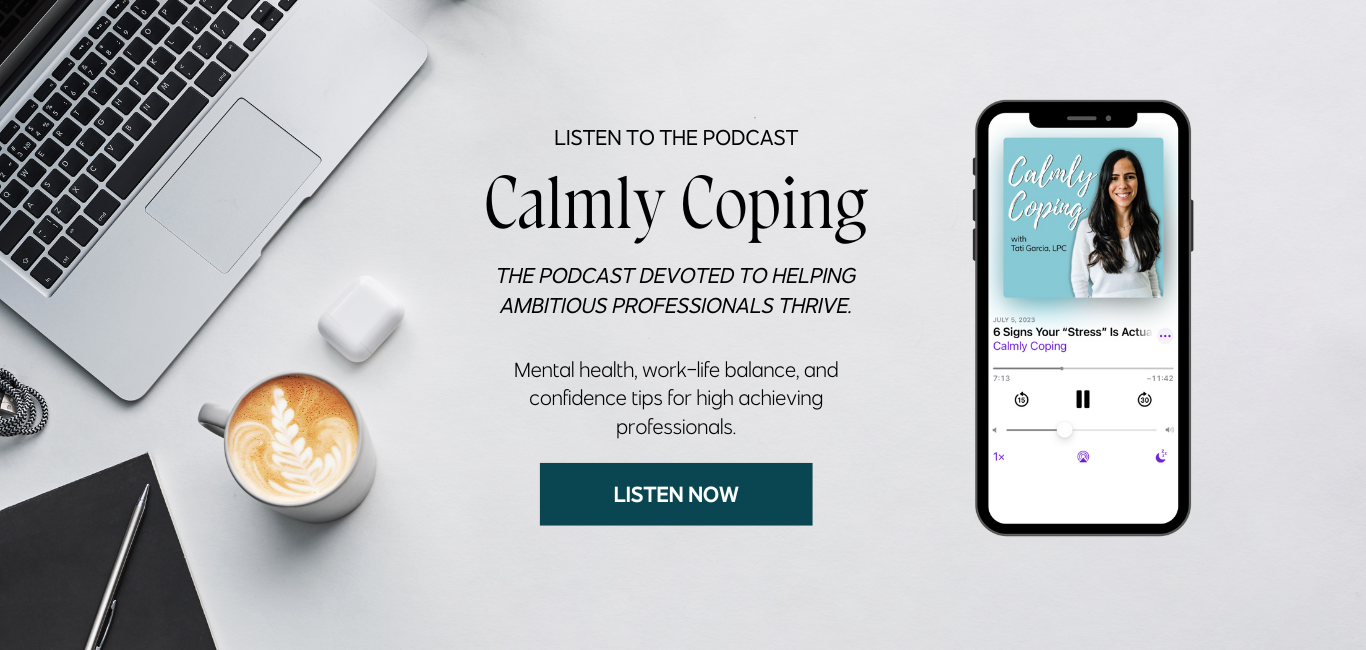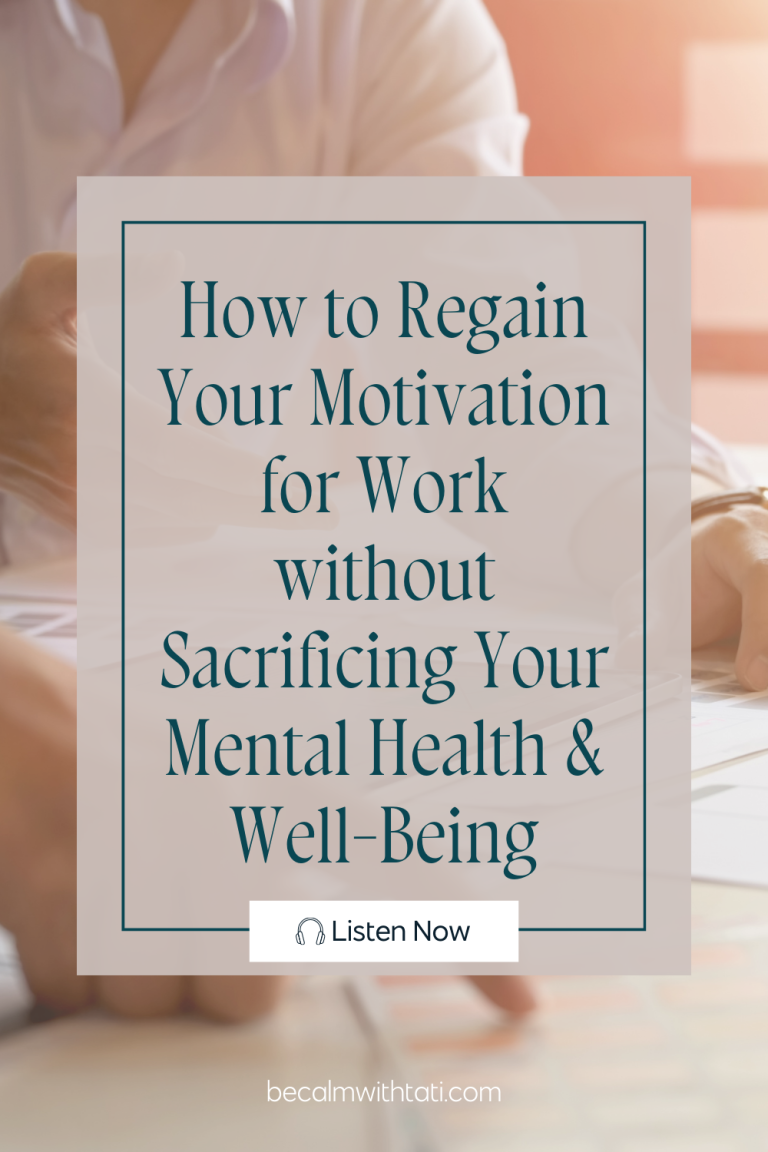Have you ever felt like you’re doing everything right, but still feel like it’s not enough? Quiet quitting has been an increasing trend over the past few years: when employees do the minimum required by their job, without going above and beyond their duties. Are you feeling unmotivated at work: done with hustle culture, burnt-out, or frustrated that you have no work-life balance? And is quiet quitting an effective way of dealing with this? In this episode, we’ll explore the circumstances that lead to quiet quitting and how to reclaim your drive without sacrificing your mental health and well-being.
In this episode, you will learn:
- The contributing factors leading to quiet quitting
- Whether or not quiet quitting is an effective way of reducing burnout and coping with work stress
- How to regain your motivation for work without sacrificing your mental health and well-being
LISTEN NOW:
🎧 CLICK HERE TO LISTEN TO CALMLY COPING WHEREVER YOU LISTEN TO PODCASTS
Sources:
https://www.hrdconnect.com/2024/06/12/quiet-quitting-the-silent-threat-to-modern-workplaces
https://www.weforum.org/agenda/2022/09/quiet-quitting-how-much-of-a-problem
https://www.tiktok.com/@zaidleppelin/video/7124414185282391342?is_copy_url=1&is_from_webapp=v1
WATCH NOW:
💬 Submit a message, question, or suggestion to the podcast: Message
FREE TRAINING: Achieve A Calm Mind, Balanced Life, & Empowered Confidence in 90 Days
If you want to learn how to take back control of your life so you can feel calmer and more confident, and learn the tools to spend your time according to what matters most to you (no matter what your schedule is like right now)…

LISTEN, REVIEW, AND SUBSCRIBE TO THE PODCAST!

INTRO/OUTRO MUSIC: Rescue Me (Instrumental) by Aussens@iter (c) copyright 2018 Licensed under a Creative Commons Attribution (3.0) license. http://dig.ccmixter.org/files/tobias_weber/57990 Ft: Copperhead
DISCLAIMER: All content here is for informational purposes only. This content does not replace the professional judgment of your own mental health provider. Please consult a licensed mental health professional for all individual questions and issues.
Interested in diving deeper to get support for high-functioning anxiety?
I offer 1:1 coaching to help high-achievers overcoming high-functioning anxiety so they can feel calmer, more present, and have improved balance in their lives. Click here if you’re interested in learning more and getting started.
Calm, Balanced, & Confident is my comprehensive A→Z self-paced course to help high-achieving professionals overcome high-functioning anxiety so they can feel calmer, balanced, and more confident without the anxiety and overwhelm. Click here to learn more and enroll today.
Looking for ongoing support and guidance with high-functioning anxiety? The Calm & Ambitious Community is the exclusive community for high achievers with high-functioning anxiety. Click here to learn more and join us today!
TRANSCRIPT:
Click to view the episode transcript.
Have you ever felt like you’re doing everything right, but still feel like it’s not enough? Quiet quitting has been an increasing trend over the past few years. It’s when employees do the bare minimum of their job without going above and beyond. Are you feeling unmotivated at work, done with hustle culture, burnt out, or frustrated that you have no work life balance? And is quiet quitting an effective way of dealing with this? In this episode, we’ll explore the circumstances that lead to quiet quitting and how to reclaim your drive without sacrificing your mental health and well-being.
Welcome to calmly coping. My name is Tati Garcia and I’m a licensed therapist and coach specializing in helping high achievers stop putting themselves last so they can feel more calm, balanced, and confident from within. If this topic interests you, then please like, subscribe and hit the notification bell so you’ll be notified every time I release a new episode.
Thank you so much for tuning in. The culture of overworking and living to work has been normalized for too long, especially in a society where the cost of living continues to rise and most households need 2 incomes to survive. This is having an increasingly negative impact on our personal lives, well-being, and relationships. With quiet quitting, it’s not about literally quitting your job, but it’s about making a decision to stop going above and beyond in your duties.
It’s about mentally disengaging from hustle culture and reducing the extra often unpaid efforts that go beyond your job description. This can be a response to burnout, feeling undervalued at work, or a way to reclaim your work life balance when pressures become too overwhelming and it just feels like it’s too much. Here’s a TikTok that went viral that describes the phenomenon of quiet quitting. I recently learned about this term called quiet quitting, where you’re not outright quitting your job, but you’re quitting the idea of going above and beyond. You’re still performing your duties, but you’re no longer subscribing to the hustle culture mentality that work has to be your life.
The reality is it’s not and your worth as a person is not defined by your labor. And quiet quitting has taken off in the wake of trends like the Great Resignation in the anti work movement that has been happening especially post pandemic. According to statistics, nearly 70% of the global workforce reports feeling burnt out at work and this is further fueling the quiet quitting phenomenon that’s happening. Here are some signs that you might be on the cusp of quiet quitting or engaging and quiet quitting, and what this behavior can look like. Maybe this looks like reduced engagement and meetings and team activities, not necessarily raising your hand to participate or to put an extra effort. A strict adherence only to your job duties, and nothing beyond that.
Increased absenteeism. A decline in responsiveness to communication, whether that’s via e-mail or chat or whatever your work uses. A lack of enthusiasm or putting yourself forward for more career development. Development, whether this is through education, training, mentorship, or otherwise.
Maybe it looks like a visible decrease in your work quality or output than what you have been previously been doing. And potentially frequent expressions of just being disillusioned from work or feeling burnt out. Where you’re mentally, physically and emotionally exhausted and feel like you have nothing left to give. These are signs that you might be mentally and emotionally checking out from work, which aligns with this idea of quiet quitting. Like I mentioned before, a quiet quitting is often a response to this hustle culture, to feeling maybe undervalued, feeling burnt out at work. And this can come from a place of high expectations.
Maybe it is high expectations that you put upon yourself. Sometimes we can have these expectations that we need to have a certain quality of work, especially if you’re somebody who is high achieving who are the types of clients that I typically work with, You may feel as though. Doing the bare minimum isn’t enough.
You need to go above and beyond. But what can sometimes happen is that this becomes unsustainable. It just becomes too much to be constantly going above and beyond. And you might put this pressure on yourself and feel like things need to constantly be perfect or you need to prove yourself. Especially if you’re somebody who oftentimes at the beginning stages of work, there can be this desire or this culture of needing to prove yourself in order to get promoted in order to get recognized. And if you’d have done that to get where you are, you can feel as though this needs to persist in order to continue moving up the ladder in order to continue moving forward in your career. However, like I mentioned before, it can sometimes be exhausting and unsustainable. In addition, there can sometimes be expectations that are coming from your employer. Maybe the job responsibilities aren’t clearly communicated and you might have a job description when you first begin a job, but maybe at a certain from point you begin taking on more and it doesn’t necessarily align with what you had originally thought the job was.
But then it starts to become just an expectation from you because you are giving more than your employer starts to expect more from you. And then this can become something that again, may get to a point where it’s not sustainable. And some workplace cultures just genuinely reinforce this. If you’re finding that your workplace encourages people to be off the clock and to be responding to emails and texts at all hours, and to constantly be saying yes to requests and doesn’t value a separation between work and personal life, then this can result in feeling this pressure to do more and then have you reach a point where you feel like I just can’t do this anymore.
These type of environments can lead to feeling unmotivated. It’s like when you’re constantly pushing and then if you feel like there isn’t validation for the work that you’re putting in or recognition and it just appears as though you’re 150% is just what’s expected from you, then you can start to grow resentful and frustrated that this extra work and time that you’re putting in, you’re just not feeling like it’s being recognized. I have worked with many individuals where they have reached a point where it’s just been unsustainable and they’ve reached a point of either burnout, feeling overwhelmed with work, feeling anxious as a result of work and and they’re getting the sense that something needs to change, but they’re just not sure what. Quiet quitting can be one response to this, but it is not the only response and I’m going to share whether or not quiet quitting is an effective response to feeling this way, as well as alternative steps that you can take. So there are benefits to quiet quitting and this can include setting boundaries and protecting your mental health. If you’re reducing the amount that you are putting forward in your effort at work and taking your personal time more seriously, then of course this can have a positive impact on your mental health.
And this can be a positive way to you set effective boundaries so that you are valuing your personal time beyond work. That you’re not just living to work, but more focusing on working to live. However, there can be downsides, especially if this is a sudden change and you just all of a sudden stop putting in as much effort.
Stop showing up in the same way that you were. This can be a red flag to your employer. They may notice it and wonder what’s going on. Why are you all of a sudden not doing the amount of work that you were doing before? And this can raise concern with your employer.
They might point this out to you. They might explore what’s going on or why you have started to engage in this reduction in your work performance. And this can also have negative impacts, of course, even though you are doing the minimum required, if you have set this expectation that you’re going to do a certain quality of work, then like I said, this is something that is unconsciously communicated to your employer and they come to expect this from you. So there can be downsides that they feel like you aren’t meeting up to the standard that they had set or that you had essentially set for yourself. And that can sometimes result in discipline or other negative consequences as a result of disengaging as a result of quiet quitting. In addition, quiet quitting is a more passive way of addressing the issues that you’re experiencing.
It’s kind of you deciding on your own. All right, I give up. I’m not going to continue to put in any more effort and I’m just going to do the bare minimum required. And that’s that, rather than you actively taking steps to either address this with your employer to quit the job if you feel like it’s really not a good fit. Or to take any alternative steps, It’s something that you are deciding oftentimes on your own. And when we look at a job and a workplace environment, this isn’t just you on your own.
Many times you’re part of a team or you have your boss or employer who is part of this workplace relationship. And so if you’re just passively making this decision on your own, then you’re really missing the larger piece of what’s affecting the way that you’re feeling, which could be being more assertive in what it is you’re feeling and what it is that your needs are in the workplace. And I’ll get into what that can look like in a little bit. However, on the other hand, if you are somebody who’s high achieving and maybe this excess pressure isn’t necessarily coming from your employer, but a big piece of it is coming from yourself. And the way that I like to describe this is that with my high achieving clients. So there is a certain amount of effort that you have to put in to get things done right After that point, people who are high achieving tend to put like double that amount of effort on top of themselves. That isn’t actually helping them to get things done, but it’s often just adding this extra mental pressure and load because there is such a strong fear often of not performing, of dropping the ball, of receiving negative feedback or criticism.
And so there can be this extra load that’s added on top, this extra pressure that is to try and avoid any negative consequences. But like I said, it’s not helping you to get your job done any more efficiently. Often times it can actually be harming you. So if you’re in the place where a lot of this extra pressure and desire to do well is mostly coming from within you, then that is when quiet quitting can be potentially beneficial because it’s not about necessarily changing the work that you’re doing or not participating as much, but it’s about that piece of quietly quitting. This additional pressure that you’re placing on yourself that isn’t necessary, that’s just creating more stress and anxiety and pressure for you. That’s one thing to keep in mind exploring what is the source of the pressure that you’re experiencing? Is it really external? Is it really within your culture? That is one piece. And then on top of that, how much of this is just coming from within you? We can often just automatically create these unconscious expectations for ourselves and not realize that they’re excessive and that maybe they’re based on past experiences.
Maybe it’s because you’re somebody who did super well in school and we’re a perfectionist or your parents had high expectations for you and now you’re carrying this with you internally into your work situation when it’s not necessarily something that is being expected from you. And this can apply whether you’re employed, whether you’re self-employed in any situation. But I think that sometimes it can be beneficial to quote UN quote quiet quit when it is that internal pressure that is on top of you. Now let’s talk about some alternatives and how you can regain gain your motivation and drive. If you’re in this place of quiet quitting and feeling like I’m done, I can’t do this anymore. So one step that I kind of touched on before is to address this with your employer, have a conversation and explore.
OK. I’m feeling really overwhelmed. I’m feeling really frustrated with my workload, whatever it is that is coming up for you. Because then it can become more of a collaborative discussion of how can we fix this if possible, how can we address this rather than something that you are managing on your own. And then you can of course decide what is the best way that you want to bring this up with your employer. I think that oftentimes for employees who are fearful of bringing up their desires with their employers and having conversations about what they need, it can help to lay common ground. All right, This is our shared goal of improving the workplace culture or of helping us to reach our goals as a company. And this is kind of what you might start this conversation with. And this is what’s getting in the way of me helping our company to reach this goal. I’d love to hear your suggestions, or I’d love to explore any alternatives for how we can.
Turn this around. Obviously, this is kind of just like a general framework of what this might look like for you addressing this. But anytime that you’re having a conversation, especially if it’s a negotiation where you can get on the same page with somebody and say, all right, we’re on the same team, how can we work together to reach this goal, then that’s going to be most of the time a more productive conversation rather than I’m done with this place, I can’t do this anymore. I mean, not denying that you may be feeling that way, and that is perfectly valid. And that can be a conversation that you can have with, let’s say, a therapist or a coach or a family member or colleague or anybody that you trust. And when it comes to this workplace conversation, you can certainly express those things if it feels safe for you to do so, however. When we’re wanting to have more of a productive conversation, then it can be helpful to address things in a more action oriented way. And this can look like, OK, I need more support and stating this, OK, this workload has just become too much for me.
Is it possible for me to delegate tasks to another person on the team? It can also look like exploring a career change or just a job change. If you’re finding that this isn’t a good fit for me, and that’s something that you would have to obviously come to this decision and explore if this is a possibility on your own. If you’re finding that you’re really feeling frustrated and resentful and like maybe you’ve already tried to make these changes and it hasn’t been effective, then exploring another job could be the step for you. So my suggestions when it comes to quiet quitting would be this mental quiet quitting where you’re not necessarily bringing back your workload, but you are removing that extra burden and that extra load that you may be placing on yourself. In addition to being proactive and communicating what your needs are within the workplace. As well as exploring any possible changes that you can do to help you to feel more supported, to help you to feel more recognized. And maybe this looks like, and this is something that I’ve done with employers in the past, saying it’s important for me to receive feedback and it’s important for me also to receive positive feedback when things are going well.
And if you’re in the place of feeling like your workplace doesn’t recognize you or doesn’t appreciate you, maybe it’s that lack of positive feedback that you’re not getting. And those are things that you can ask for because not everybody’s good at giving positive feedback. And hopefully you have an employer or a workplace who is open to suggestions from you of how they can best support you. So I encourage you to reflect on your own work life balance and how you’re feeling at your job. Are you at the point of quiet quitting? Are you feeling like there are some changes that you can make to help you feel more supported, recognized, or more motivated in your workplace? And how can you balance this internal versus external? You know, the internal doing the inner mindset work, recognizing your emotions and understanding how you’re putting this excess pressure on yourself in addition to the external of having conversations, accepting things.
If there’s something about the culture that you just can’t change and or making moves to find a new job or find a different career that is a better fit for your needs. All of these are valid responses. If you’re in this place of feeling like you’re unmotivated and done and needing to make a change, I’d love to hear your thoughts on this topic in the comments below. If you’re watching on YouTube or if you are listening on Spotify, let me know if you’re at a point of quiet quitting and what you would want to do about it. And make sure you subscribe wherever you’re listening or watching so that you can get notified when my next episode comes out. It is on the hidden reason you can’t stop being productive. And while you wait for next weeks episode, I have other episodes on calming your mind, increasing work life balance and feeling more confident from within. So you can check out these episodes here.
Thank you so much for tuning in today. Until next time, be calm.


Until next time…













